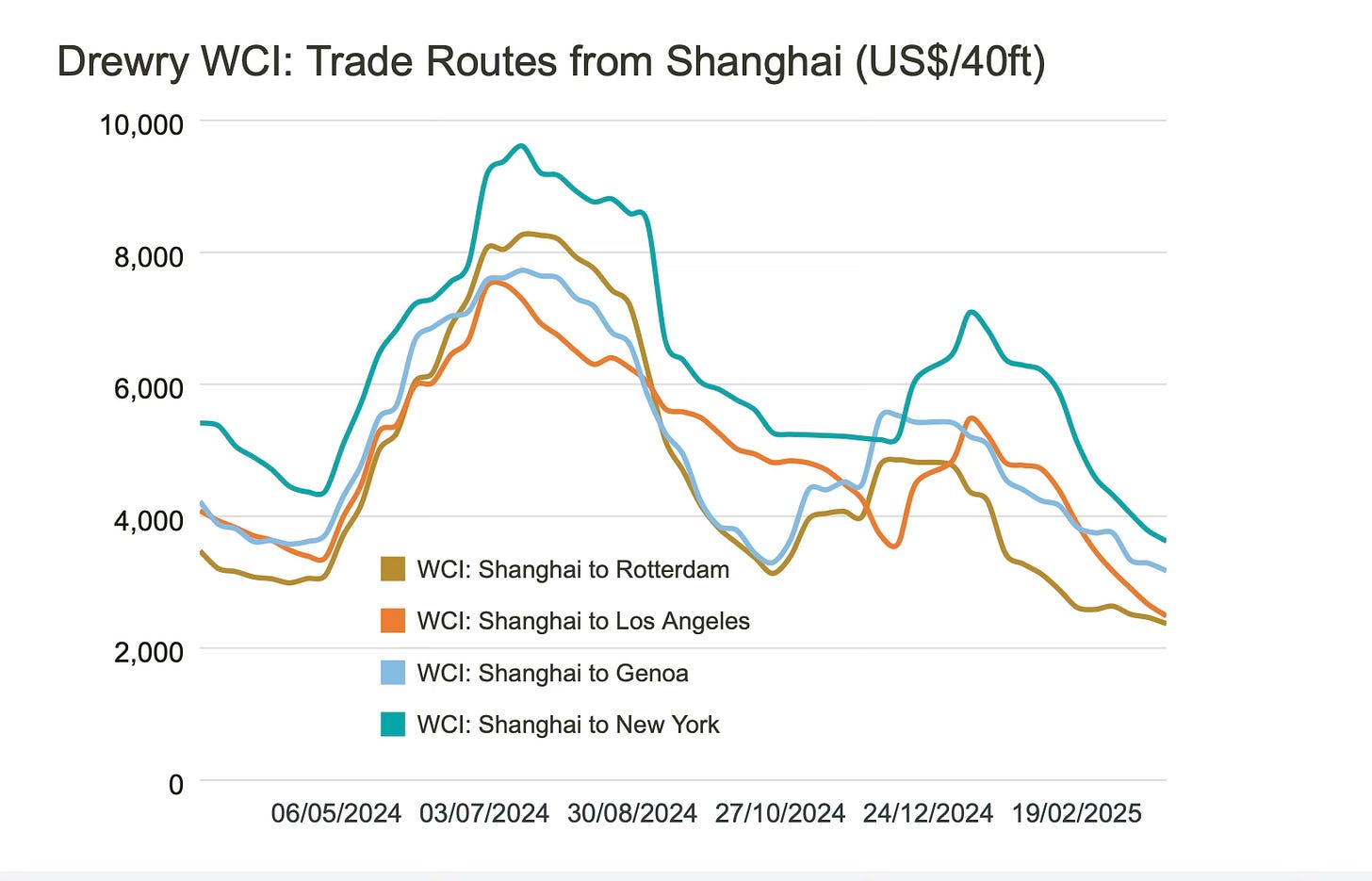Slowdown at top U.S. container ports signals a downshift in global cargo flow
Tariff turmoil, trade war skirmishes turning 2024 optimism to 2025 pessimism along North America’s waterfront as Canada faces an identity and values crisis
February’s dip in cargo flow at North America’s biggest container ports has triggered another warning light on the continent’s economic engine dashboard.
U.S. trade war offensives that are upending sectors ranging from energy and steel production to automobile manufacturing already have red lights flashing for Canada.
But alarm is warranted elsewhere in North America.
The latest container port data compiled by New York-based container shipping analyst John McCown shows February’s year-over-year growth in imports flowing through the top 10 U.S, container ports dropping to 3.4%. That’s down from January’s (13.7%) and December’s (14.2%) year-over-year increases.
McCown noted that February’s increase was the smallest import volume gain in 16 months and “is a sharp contraction from what were mostly double-digit percent gains over that period.”
Export data was even more sobering: down 13% in February compared with February 2024. That drop followed January’s 4.8% year-over-year decrease.
The most recent World Container Index (WCI) data from U.K.-based shipping consultancy Drewry reflects that downshift in maritime cargo flow worldwide.
The index of freight rates tracked across eight major trade lanes connecting Asia, Europe and the Americas shows a 4% decrease to US$2,168 per 40-foot container. That is 79% below the previous pandemic economy peak of US$10,377 recorded in September 2021.

Drewry noted, however, that the most recent WCI rate is still 53% higher than the average US$1,420 recorded in pre-pandemic 2019.
Previous Substack Shipping News reports have chronicled the economic impact of the Trump administration’s 25% tariff on all auto imports to the U.S. and the potential cost increases to ocean carriers from U.S. port levies set to be charged on ships built in China.
Little wonder then that cargo flow is headed for the doldrums.
The slowdown could also be worse for West Coast ports. Transpacific container cargo has been migrating away from the West Coast to East and Gulf coast ports since the expanded Panama Canal opened in June 2016.
Sea miles are cheaper than land miles in the cargo movement business. Combine that factor with North America’s population distribution and growth and the March 11 ratification of a new six-year International Longshoremen’s Association contract with the U.S. Maritime Alliance and that eastward container cargo migration is bound to accelerate.
However, the Trump tariff turmoil could be a blessing in disguise for Canada.
I believe this is a real opportunity for Canada, and 20 years from now, we'll thank Donald Trump for having forced us to have a very hard look at our economy, at the way our federal system of government works and our place in the world
–Jean Charest, former Quebec premier and Conservative MP
It has done more than trigger economic engine warning lights and Canadian sovereignty alarm bells. It has awakened nationalism in Coddle Country.
Former Quebec premier and Conservative MP Jean Charest summed up the opportunity in that awakening during a Canada West Foundation panel discussion earlier this year on the country’s looming U.S. tariff and trade challenges.
“I believe this is a real opportunity for Canada,” he said, “and 20 years from now, we'll thank Donald Trump for having forced us to have a very hard look at our economy, at the way our federal system of government works and our place in the world.”
Charest added that the country, during the past few years, has lost its way “in regard to who we are and what we want to do relative to the rest of the world.
“Canada is now faced with a unique opportunity to redefine itself, rebuild the bridges between the [country’s] east and west, build a stronger economy and play a more important role in the world, and we should not miss this opportunity. The United States is one story, but this is about us.”
That “us” needs a lot of rehab. In Coddle Country, it has become complacent, dependent, unfocused and unproductive.
As cartoonist Walt Kelly’s classic Pogo strip so astutely observed: “We have met the enemy, and he is us.”
www.linkedin.com/in/timothyrenshaw
@trenshaw24.bsky.social
@timothyrenshaw



